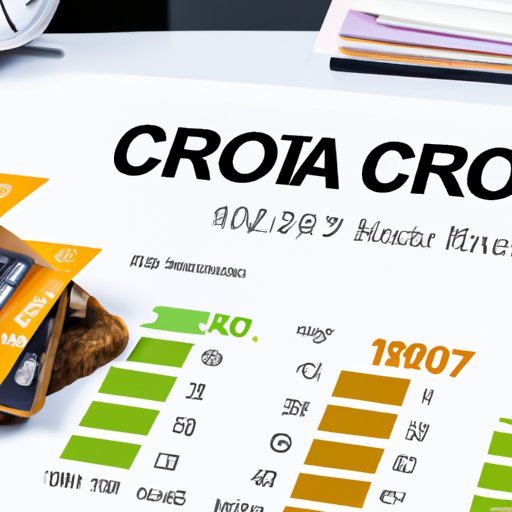Introduction
A credit score is a numerical expression that evaluates a person’s creditworthiness. It is based on the data in an individual’s credit report, which is compiled by credit bureaus using information from creditors. A high credit score is a sign of good credit health, while a low credit score can be indicative of bad credit habits or even identity theft.
Having a low credit score can make it difficult to obtain loans or other forms of credit. It can also result in higher interest rates and fees when borrowing money. Fortunately, there are steps you can take to improve your credit score and get back on track to having good credit health.
Pay Bills On Time
Paying bills on time is one of the most important factors in determining your credit score. Late payments can have a negative impact on your credit score and can remain on your credit report for up to seven years. Paying bills on time is essential in maintaining a good credit score.
Benefits of Paying Bills On Time
Paying bills on time has many benefits. Not only does it keep your credit score high, but it also helps you avoid late payment fees and maintain a positive relationship with your creditors. Additionally, paying bills on time helps to demonstrate your ability to manage debt responsibly.
Strategies to Ensure Payments Are Made On Time
There are several strategies you can use to ensure that your bills are paid on time. Setting up automatic payments is one of the easiest ways to ensure that your bills are paid on time. You can also set reminders for yourself to help you remember when payments are due.
Another helpful strategy is to check your credit report regularly to make sure all payments are accurately reported. This will help you stay on top of any late payments that could affect your credit score.

Pay Down Credit Card Balances
Credit utilization is another important factor in determining your credit score. Credit utilization is the ratio of the amount of credit you are using compared to the total amount of credit available to you. Generally, a lower credit utilization shows lenders that you are managing your debt responsibly.
Benefits of Paying Down Credit Card Balances
Paying down credit card balances has many benefits. It can help to reduce your overall debt load, as well as decrease your credit utilization. This can have a positive impact on your credit score and show lenders that you are managing your debt responsibly.
Strategies to Pay Down Credit Card Balances
One strategy for paying down credit card balances is to use the “snowball method.” This involves focusing on paying off the smallest balance first, then moving on to the next smallest balance, and so on. This strategy can help to keep you motivated and focused on paying off your debt.
Another strategy is to set up automatic payments to ensure that your credit card balances are always paid on time. You can also look into balance transfer offers that can help you pay down your debt more quickly.
Monitor Credit Reports for Errors
It is important to monitor your credit reports for errors, as these can have a negative impact on your credit score. Errors can include incorrect personal information, inaccurate account information, or even fraudulent accounts.
Benefits of Monitoring Credit Reports
Monitoring your credit reports for errors can have many benefits. It can help you catch any inaccuracies that could be negatively impacting your credit score. Additionally, it can help you protect yourself from identity theft and other types of fraud.
Strategies to Monitor Credit Reports
The best way to monitor your credit reports is to review them regularly. You can request a free copy of your credit report from each of the three major credit bureaus (Equifax, Experian, and TransUnion) once per year. Additionally, you can sign up for a credit monitoring service to help you keep track of changes to your credit report.
Limit New Credit Applications
Applying for new credit can have a negative impact on your credit score. Every time you apply for new credit, lenders will perform a hard inquiry, which can temporarily lower your credit score. Therefore, it is important to limit the number of new credit applications you submit.
Benefits of Limiting New Credit Applications
Limiting new credit applications can have many benefits. It can help to keep your credit score high, as well as prevent you from taking on more debt than you can handle. Additionally, it can help you avoid costly interest charges and fees associated with new credit accounts.
Strategies to Limit New Credit Applications
One strategy for limiting new credit applications is to only apply for credit when you absolutely need it. Additionally, you should research different lenders to find the best rates and terms before applying for a loan or credit card. Finally, you should make sure that you meet all the requirements before submitting a new credit application.
Utilize Credit Responsibly
Utilizing credit responsibly is essential for maintaining a good credit score. This means using credit only when necessary and making sure that you pay your bills on time and in full.
Benefits of Utilizing Credit Responsibly
Utilizing credit responsibly has many benefits. It can help you build a good credit history, which can make it easier to get loans or other forms of credit in the future. Additionally, it can help you avoid costly interest charges and fees associated with mismanaging your credit.
Strategies for Utilizing Credit Responsibly
One strategy for utilizing credit responsibly is to only use credit when it is absolutely necessary. Additionally, you should make sure to pay your bills on time and in full. Finally, you should try to keep your credit utilization ratio below 30%.
Seek Professional Help
If you are struggling to improve your credit score, you may want to consider seeking professional help. There are many professionals who specialize in helping people improve their credit scores.
Benefits of Seeking Professional Help
Seeking professional help can have many benefits. A qualified professional can help you create a plan for improving your credit score and provide guidance on how to manage your debt responsibly. Additionally, they can help you dispute any inaccurate information on your credit report.
How to Find a Qualified Professional
When looking for a qualified professional to help you improve your credit score, it is important to do your research. Check to make sure the professional you are considering is licensed and has experience helping people improve their credit scores. Additionally, you should read reviews to make sure the professional is reputable and trustworthy.
Conclusion
Improving your credit score is not an overnight process, but it is possible with the right approach. Paying bills on time, paying down credit card balances, monitoring credit reports for errors, limiting new credit applications, utilizing credit responsibly, and seeking professional help are all effective strategies for improving your credit score. With dedication and perseverance, you can get your credit score back on track.
(Note: Is this article not meeting your expectations? Do you have knowledge or insights to share? Unlock new opportunities and expand your reach by joining our authors team. Click Registration to join us and share your expertise with our readers.)
